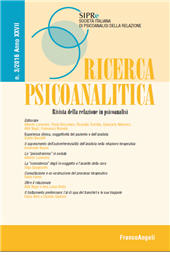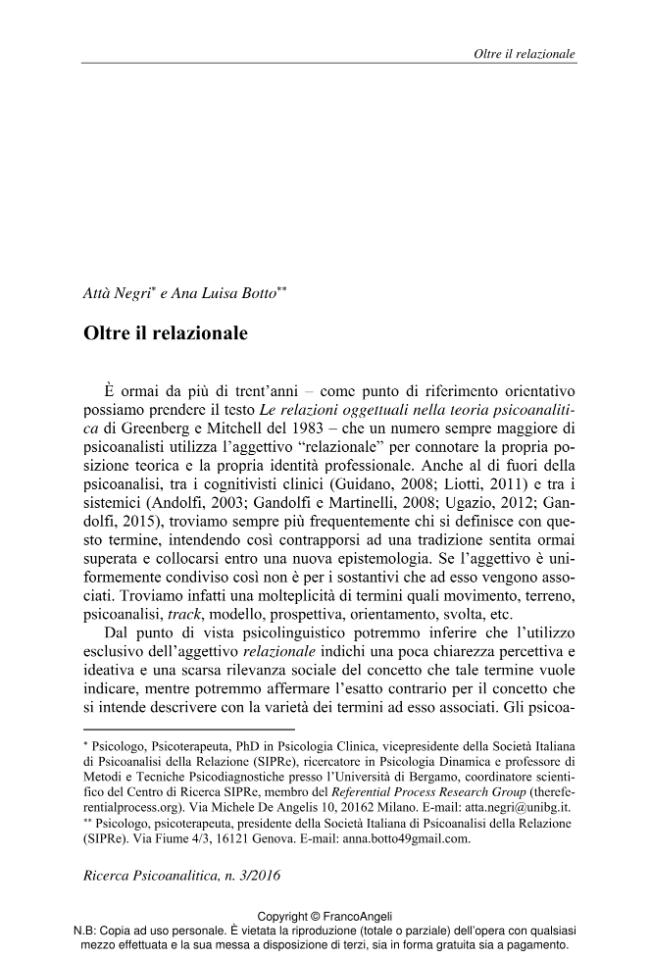Oltre il relazionale
87-105 p.
Viene proposto un bilancio delle principali acquisizioni epistemologiche, teoriche e cliniche che all'interno della psicoanalisi gli autori che si definiscono e vengono definiti come relazionali ci hanno consegnato negli ultimi trent'anni. A partire dal riconoscimento del carattere straordinariamente innovativo e ricco di tale insieme di nuove conoscenze, sensibilità e convinzioni viene argomentata la necessità di andare oltre in questo percorso di cambiamento lungo tre principali direttrici: a) la costruzione e condivisione di una teoria generale della mente in relazione che fornisca una spiegazione di come il soggetto costruisce psicologicamente la relazione con il contesto in molteplici modi e a molteplici livelli, b) il passaggio da una psicologia bipersonale a una multipersonale, considerando la relazione tra due persone sempre permeata da una molteplicità di partner conversazionali e individuando le configurazioni familiari tipiche che possono portare a sofferenza, c) elaborando una teoria della tecnica
coerente con l'epistemologia e la teoria della mente in tale contesto scelte, dove possono prendere nuovo significato tecniche psicoterapeutiche già da tempo utilizzate e esserne create di nuove, più utili e pertinenti con il nuovo frame teorico. La sfida proposta è quella di un lavoro congiunto tra i relazionali dei principali approcci clinici, guidati dalla necessità di una sempre più consapevole assunzione di responsabilità professionale nelle scelte che compiamo quotidianamente nelle relazioni con i pazienti. [Testo dell'editore].
The authors propose an appraisal of the major epistemological, theoretical and clinical acquisitions consigned over the last thirty years by the authors self-defined and defined within psychoanalysis as relational. Starting from the recognition of the innovative and extraordinarily rich character of this set of new knowledge, attitudes and beliefs it is argued the need to go further on this path of change along three main directions: a) the construction and sharing of a general theory of the mind in relation, giving an explanation of how the subject psychologically constructs the relationship with the context in many ways and at many levels, b) the shift from a two-person psychology to a multi-persons psychology, considering the relationship between two people always permeated by a multiplicity of conversational partners and identifying the typical family configurations that can lead to suffering, c) developing a theory of the technique coherent with the epistemology and theory of mind in this context chosen,
where can take new meanings some psychotherapeutic techniques since a long time used and can be created new ones, more useful and appropriate to the new theoretical frame. The proposed challenge is a joint working between the relational psychotherapists of the main clinical approaches, guided by the need for more and more conscious assumption of the professional responsibility in the choices we make every day in relations with the patients. [Publisher's Text].
-
Articles from the same issue (available individually)
-
Information
ISSN: 2037-7851
KEYWORDS
- Psicoanalisi relazionale, epistemologia della complessità, teoria della mente, psicologia multipersonale, tecniche psicoterapeutiche relazionali
- Relational psychoanalysis, complexity epistemology, theory of mind, multipersonal psychology, relational psychotherapeutic techniques



